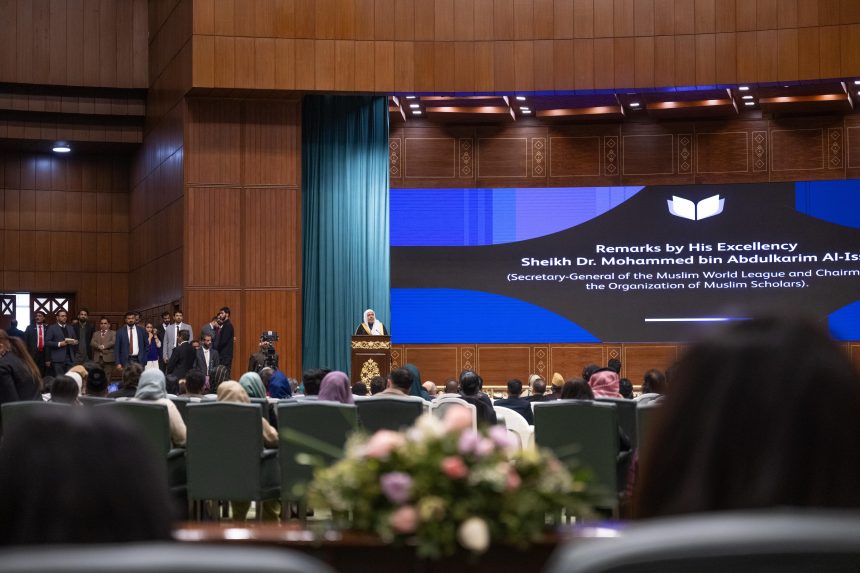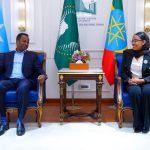Islamabad (UNA) – The World Conference of the Muslim World League (MWL) Initiative for Girls’ Education in Muslim Societies concluded on Sunday in Islamabad, Pakistan, with the launch of the “Islamabad Declaration on Girls’ Education in Muslim Communities: Challenges and Opportunities”. The declaration received historic support from senior scholars, Islamic Fiqh academies, representatives of international organizations, governmental and non-governmental academic institutions, and global activists. Additionally, the conference saw the establishment of a platform for international partnerships—referred to as the “executive arm of the initiative”—as well as the signing of over XNUMX global agreements and pledges by senior scholars, heads of Islamic academies and councils, representatives from United Nations organizations, and leaders of international governmental, and non-governmental research, academic, and media organizations and institutions.
The announcement of the Declaration and the launching of the platform were attended by His Excellency the Secretary-General of the Muslim World League (MWL), Chairman of the Organization of Muslim Scholars, His Eminence Sheikh Dr. Muhammad bin Abdulkarim Al-Issa, along with representatives from the Government and Parliament of the Islamic Republic of Pakistan, sponsor of the Muslim World League initiative for Girls’ Education in Muslim Societies. Also present were senior muftis, scholars from the Islamic world, members of Islamic Fiqh academies and scholarly councils, global advocates for girls’ education such as Ms. Malala Yousafzai, as well as a number of ministers of education and higher education from Islamic countries. The event was also attended by representatives from the League of Islamic Universities and the United Nations Academic Platform (UPEACE).
The “Islamabad Declaration on the Girls’ Education in Muslim Communities: Challenges and Opportunities” draws inspiration from two historic documents: the “Makkah Al-Mukarramah Document” and the “Building Bridges Between Islamic Madhabs” document, both issued by the Muslim World League with the consensus of Muslim scholars. These documents were endorsed in Makkah, under the generous patronage of the Custodian of the Two Holy Mosques, King Salman bin Abdulaziz Al Saud (may God protect him). Both documents emphasize the empowerment of women through education at all levels, within a balanced framework that aligns with their nature and is in accordance with the teachings and high values of Islam. They both reject acts intended to marginalize, diminish, or disrespect women’s dignity and role.
The Declaration was also founded on the outcomes of a closed session attended by Their Eminences, the Grand Muftis, and scholars of the Ummah from various Islamic Madhabs, alongside representatives from Fiqh academies. This session took place on Friday, the XNUMXth of Rajab, XNUMX AH,at the Conference Center in Islamabad, the capital of the Islamic Republic of Pakistan. It was chaired by His Excellency the Secretary General of the Muslim World League and Chairman of the Organization of Muslim Scholars, His Eminence Sheikh Dr. Muhammad bin Abdulkarim Al-Issa, as part of the Muslim World League initiative: “Girls’ Education in Muslim Communities: Challenges and Opportunities”.
A number of distinguished scholars, including the Grand Muftis of the Islamic World, members of various scholarly councils and bodies from different Islamic Madhabs, as well as representatives from the Islamic Fiqh Council of the Muslim World League and the International Islamic Fiqh Academy of the Organization of Islamic Cooperation (OIC), convened in a closed session, during which they discussed a critical issue of concern for the Islamic world: the right of girls to education, emphasizing that there should be “no limited ceiling” or “hindering conditions.”
At the conclusion of their session, the scholars unanimously affirmed that women’s education is a legitimate right, firmly grounded in Islamic law, which upholds the seeking of knowledge as an obligation for every Muslim—whether man or woman. They emphasized that this right cannot be restricted by age, level, or specialization, and no reservations regarding this principle should be attributed to Islamic Law. Scholars from all Madhabs and schools, both traditional and contemporary, have agreed on the legitimacy of women’s education on the same basis as that of men.
The scholars also highlighted the danger of distorting the meanings of religious texts and contradicting their supreme objectives to justify misconceptions, including the promotion of customs and traditions or other agendas. They explained that such actions represent one of the greatest violations of Sharia.
The signatories of the Declaration recognized and valued the strategic importance of bringing together this unprecedented diversity of influential religious leaders. Their collective participation was crucial in clarifying the guidance of Islamic law on this urgent issue, which had long remained unresolved due to controversies that escalated for various reasons and objectives
It is well known that any issue rooted in religious thought can only be effectively addressed through the active and unified participation of religious scholars, who are qualified to clarify the legitimate truth. This truth must be expressed by all the influential and concerned scholars of the Islamic Ummah, who have the knowledge to decide matters.
The conference participants also assigned His Excellency the Secretary-General of the Muslim World League and Chairman of the Organization of Muslim Scholars, Sheikh Dr. Muhammad bin Abdulkarim Al-Issa, to communicate the Declaration to the relevant parties and to ensure its activation. This includes reaching out to Islamic governments through His Excellency the Secretary-General of the Organization of Islamic Cooperation, (in accordance with the agreement signed between the two organizations), as well as to governmental and non-governmental educational institutions in Islamic countries and Muslim minority countries.
The participants also entrusted His Excellency with the task of forming a permanent committee to monitor the implementation of the outcomes of this significant event, including the signed agreements, which will pave the way for effective action. His Eminence affirmed this in his remarks, stating: “This initiative will, God willing, have a ‘tangible impact’ through the qualitative agreements signed.” He further emphasized: “This initiative will not be a mere “Temporary call,’ void declaration,’ or an “expression of Stance,’ but it will mark a transformative shift in the advancement of girls’ education. Every deprived girl will benefit from it, and every society, in desperate need of its younger generation, both male and female, will rejoice in its success.”
The conference participants also expressed their sincere gratitude to the Prime Minister of the Islamic Republic of Pakistan for his generous support and sponsorship of the event. They extended their thanks to the Muslim World League (MWL) for this initiative, launched by His Excellency the Secretary-General on behalf of the MWL and its bodies, councils, and international academies. Additionally, they thanked the MWL for the excellent organization, the distinct discussion topics, and the efficiency with which the dialogues were managed.
Link to Islamabad Declaration on Girls’ Education:https://themwl.org/ar/girls-education-in-muslim-communities
Partnerships:
These partnerships included the signing of a memorandum of understanding (MOU) between the Muslim World League (MWL) and the Organization of Islamic Cooperation (OIC), aimed at establishing a strategic alliance between them to support the girls’ education initiative. Additionally, these partnerships led to the implementation of projects and studies focused on girls’ education and addressing misconceptions in this area, through agreements between the MWL Islamic Fiqh Academy, the OIC International Islamic Fiqh Academy, and the Union of OIC News Agencies (UNA).
Additionally, these partnerships led to the implementation of projects and studies focused on girls’ education and addressing misconceptions in this area, through agreements between the MWL Islamic Fiqh Academy, the OIC International Islamic Fiqh Academy, and the Union of OIC News Agencies (UNA).
These partnerships also included the provision of scholarships for Muslim girls in universities, as well as training and capacity-building programs in leadership and problem-solving.
The MWL signed agreements with a range of Islamic and international universities, the League of Islamic Universities, the United Nations University for Peace (UPEACE), the United Nations High Commissioner for Refugees (UNHCR), and the UN Children Fund UNICEF in this regard. Furthermore, the MWL established several partnerships with international organizations to enhance cooperation in the field of research, studies, and reports on women’s issues, as well as organizing media campaigns to raise awareness about girls’ right to education.
The partnerships also saw the launch of several pledges by international academic organizations and institutions to support girls’ education and improve their access to educational opportunities through various programs, grants, and assistance.





